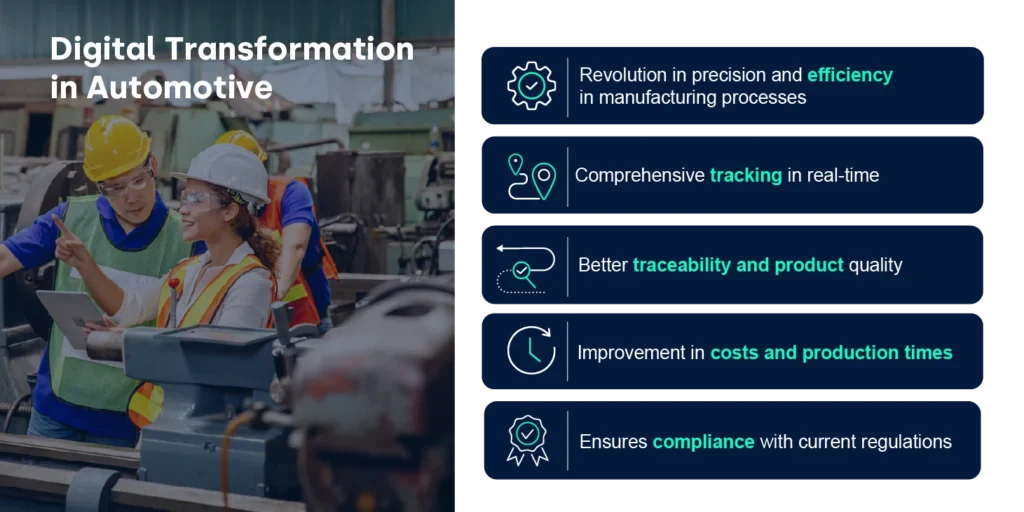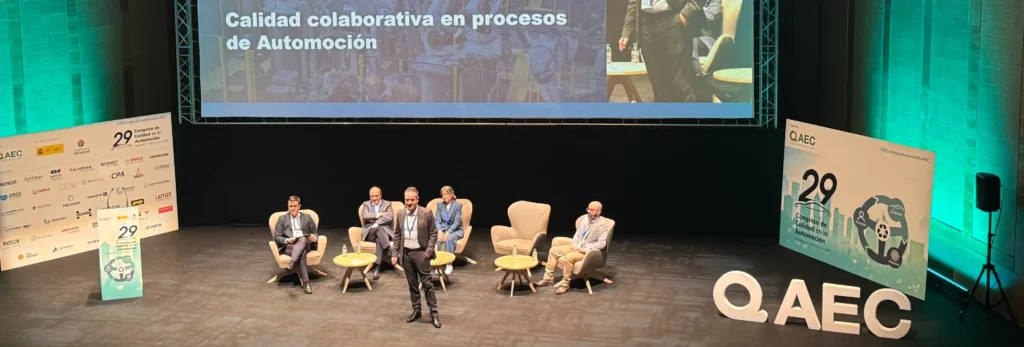Quality in the automotive sector cannot be compromised and, for this reason, the 29th Automotive Quality Congress, held in Valladolid by the Spanish Association for Quality (AEC), emphasized the importance of increasing efficiency at three levels: People, Processes and Products.
The 3Ps of Automotive: People, Processes and Products
The interrelationship between People, Processes and Products, the 3Ps of Automotive, is essential to achieve the levels of efficiency and quality demanded by the market.
As was made clear at the Congress, flexibility, collaboration and digitization of processes are driving efficiency in the automotive industry at a time of constant environmental, technological and geopolitical change.
Persons
People are the most valuable element for companies in the sector, since they are the source of the design of processes and products, as well as customer service. In this sense, the industry’s main challenge is to attract talent and optimize talent management.
Processes
Meanwhile, automotive manufacturing processes are undergoing a transformation driven by artificial intelligence, big data and decarbonization. In addition, Spanish and European companies are being forced to look for new ways to improve efficiency by pressure from the Asian market. In this regard, a holistic approach is being adopted that combines quality, finance and environment, with an emphasis on cross-departmental collaboration.
Products
The Product, on the other hand, is no longer a differentiating element, now it is the service. Consumer behaviors determine that people are no longer looking for a car, they are looking for the experience of connection, communication and active safety elements.
The challenge of digital transformation in automotive
Digitalization in the automotive sector has been a constant for decades. However, the new wave of digitalization led by artificial intelligence (AI) is changing all processes without precedent.
While Asian competitors have found the formula to reduce design and production times with the use of highly advanced technologies, in Europe there is still a need to gain speed without losing the quality of service that characterizes the companies.
Therefore, it is particularly important to digitize all the processes that take place within the factories, since their correct management not only ensures the quality of operations, but will also allow optimizing costs, reducing time and improving the satisfaction of the end customer.
In this regard, David Perez, Industry Manager of FIELDEAS, made a presentation during the session dedicated to “Processes” in the 29th Automotive Quality Congress to present practical experiences in the digitization of processes in the automotive sector, especially with digital forms.
This round table discussion addressed the importance of processes in the automotive industry, which is highly demanding in terms of quality.
In this sense, it was concluded that processes, in addition to being efficient and robust, must be flexible in order to achieve excellence in operations.

Digital forms in the automotive industry, allies of efficiency
Digital forms offer a robust and efficient solution for data collection and management in automotive manufacturing processes.
This is demonstrated in the success stories presented by the FIELDEAS Industry Manager at the meeting.
SEAT case study: automotive digital forms
At SEAT Martorell we have been working for eight years with a suite of solutions, “Hermes All in one”, for the different departments.
The process digitalization project at SEAT is fully collaborative, as we interconnect all departments on our platform, thus eliminating data islands.
The solutions we have applied at SEAT Martorell are as follows:
Quality alarms module – Surface Quality App with AI
Users of any department report through digital forms the anomalies they detect.
In this way, with the detection of this defect and its origin, we involve in the chat the main actors that have to be part of the resolution of the defect.
Within this module we also have a configuration of escalation times. That is to say, when a quality alarm is opened, the resolution time is taken into account and if it is not resolved, different groups of users (technical managers, managers, directors…) are involved until the defect is resolved.
This has a final report and all the data is grouped to configure the artificial intelligence of the module. In this way, our solution detects patterns to be able to give the user suggested solutions and, thus, offer agility to solve quality alarms.
Installations check module
With this module we have interconnected the maintenance department with the production department.
When a new machine installation order is generated, it is executed by the maintenance team. Once the work order is completed, a checklist is generated for the production team, who, if it detects any failure in the new installation, generates a new maintenance work order. In this way, a constant communication flow is established between both departments.
Quality guidelines module for new model launches
FIELDEAS Forms adapts to many clients to make the checks and field sheets.
In the case of SEAT, it is used in quality when there is a new model launch. Our solution generates interconnection between the prototyping and assembly departments, which collect data in the field of the whole process of the new launch, in order to speed up the manufacturing of the same, since this process allows having detected the weak points in the manufacturing process.
In this way we obtain greater quality control in production changes; digitalization and automation of manual paper processes; and real-time data analysis.

Reworks and CarTracker modules
Reworks is a rework application. That is, defects are detected on vehicles in production and the solution optimizes repair management, as well as product diversion to rework areas.
CarTracker, on the other hand, focuses on the management of the parking lot of vehicles to be reworked. Based on the defect detected in those vehicles, our application suggests the parking space in the repair areas.
In turn, this application also manages what we call the “TaxiDriver”, which is the movement of the vehicle from the assembly line to these final repair areas.
Cupra Talk” messaging system
It is an instant messaging solution in which communications have no risk of being insecure. It is for all company employees and is a secure, supported, multi-device and scalable environment.
APPLUS IDIADA Case Study: Digital forms for the automotive industry
For the last year and a half we have been working on the digitalization of APPLUS IDIADA’s passive safety testing processes with our digital forms.
To date, the company has worked with more than 120 online forms, which they have been able to design themselves according to their needs thanks to the flexibility of our solution, based on a drag & drop model.
Global digitization of quality inspections with FIELDEAS Forms
Digital forms are highly versatile tools that can be used at all stages of the product life cycle, from initial research to the decline phase. They facilitate the collection, management and analysis of crucial data for product development, launch, marketing and continuous improvement.
In automotive quality inspections, digital forms are great allies, as they simplify processes and, therefore, increase efficiency.
Solutions such as FIELDEAS Forms provide a series of very important values in the automotive sector, such as:
- Revolution in precision and efficiency in manufacturing processes
- Exhaustive and real-time monitoring
- Improved product traceability and quality
- Improved costs and production times
- Assurance of compliance with regulations in force
In addition, our solution offers:
- Noncode tool for design
- Inspections with enriched data
- Forms with conditional rules and validations
- Dynamic reports with biometric signature
Added values of FIELDEAS Forms
- Offline operation
- Advanced data types
- Geolocation and versioning of responses
- Control of response times
- Interactive runtime warnings for out-of-range data
- Integration with corporate systems
- Assignment to internal and external users
- Linked forms
- Conditional fields and regular expressions
- Final Report (PDF)





